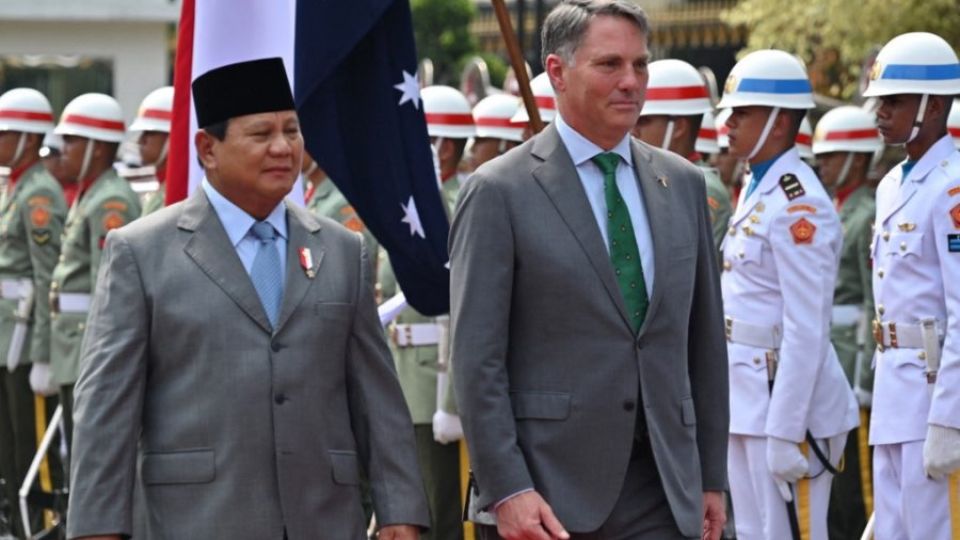June 7, 2023
JAKARTA – Defense Minister Prabowo Subianto’s Ukraine peace plan suggestion at the Shangri-La Dialogue at the weekend hung over a meeting with Australia’s visiting Deputy Prime Minister and Defense Minister Richard Marles, who reiterated Canberra’s full support of Ukraine while noting that any peace solutions should be based on Kyiv’s terms.
Marles was a guest to Prabowo in Jakarta on Monday, the latest stopover in a trip across the Indo-Pacific.
Refusing to issue any comments about Prabowo’s peace plan, which was deemed “strange” by Ukrainian Defense Minister Oleksii Reznikof, Marles instead explained that military cooperation with Jakarta was among Australia’s top regional priorities.
“Clearly all the defense ministers were speaking about Ukraine over the course of the [Shangri-La Dialogue]. I’ll let Minister [Prabowo] speak for himself,” Marles told reporters in Jakarta after the meeting. “Australia made its position in respect of that very clear at the outset.”
Over the weekend, hundreds of delegates hailing from over 40 countries assembled in Singapore for one of the region’s biggest foreign policy and defense forums to mull over pressing global security issues, including Russia’s war in Ukraine and sharpening tensions between the United States and China.
The event saw Prabowo announcing a peace strategy to facilitate the end of Russia’s invasion, a five-point suggestion that included a truce, the establishment of a demilitarized zone and the deployment of a monitoring force from the United Nations, which would also kickstart a referendum process in the disputed areas.
The peace plan garnered mixed reviews, with some welcoming the suggestions while others questioned them.
Ukraine’s Ambassador to Indonesia Vasyl Hamianin said in a statement on Monday that while Kyiv “appreciated” Indonesia’s concern, Prabowo’s suggestion was not in line with Kyiv’s requirement that peace be settled by the withdrawal of all Russian troops in Ukraine.
“[Indonesia’s plan], as it seems, has drawn conclusions based on its own history,” he said, in a thinly veiled reference to Timor-Leste’s independence from Indonesia.
“Ukraine’s internationally recognized border must be recovered from Russian troops, and we will not accept any other scenario,” he asserted.
Dewi Fortuna Anwar, a senior international relations analyst from the National Research and Innovation Agency (BRIN), said Prabowo’s plan, despite “coming from a good place”, could be misconstrued as acknowledging Ukraine’s invaded areas as “disputed” rather than occupied.
“I think that he is a politician, not an analyst or an experienced commentator on international affairs. […] He should’ve sought input from the Foreign Ministry and Ukraine itself,” she told The Jakarta Post on Monday.
National Resilience Institute (Lemhannas) governor Andi Widjajanto, in a separate statement on Monday, suggested that Prabowo’s peace plan was evidence of his focus on “global collaboration, collective leadership, teamwork and multilateralism”.
The Foreign Ministry was not immediately available for comment.
A globalist?
Being markedly outspoken at the Shangri-La Dialogue, analysts have noted that Prabowo, who is also running for president next year, may see himself as an aspiring globalist leader whose interests do not stop at the domestic or regional levels.
Despite having lost to President Joko “Jokowi” Widodo two times in previous elections, partly due to his questionable human rights record, an early May poll indicated that the Gerindra Party chairman scored the highest electability rating of 18.3 percent, compared with his potential rivals, Central Java Governor Ganjar Pranowo and former Jakarta governor Anies Baswedan.
Unlike Jokowi, the experts added, who spent a majority of his administration focusing on domestic issues, Prabowo’s apparent interest to shine on the global stage may indicate a more foreign policy-focused Indonesia should he convert his popularity into votes next year.
“Looking at his military and educational background, he is someone quite experienced in international issues. […] He has the interest, knowledge and expertise to communicate on the global stage. Whether his ideas are sound or not is a different issue altogether,” Dewi suggested.
At the bilateral level, Prabowo appeared keen to burnish his credentials at the Shangri-La Dialogue but also on home turf, as he played host to Australia’s Marles and another defense counterpart from Germany.
With Canberra, Marles said that the two ministers discussed the drafting of an “ambitious” defense cooperation agreement (DCA) aimed at safeguarding Indo-Pacific security.
The sheer scale of the DCA, he prefaced, may warrant up to “a decade” of negotiations and drafting before being finalized. Analysts were ambiguous about this set timeline, which is the exact length of two presidential terms, though noted that a similar pact with Singapore took 15 years to finalize.
“Since we started this in February, both [nations] provided observations that this is moving forward well, and that we’re confident that we can get this done,” Marles said.


